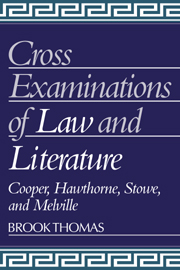10 - Ragged Edges
Published online by Cambridge University Press: 08 October 2009
Summary
Billy Budd, Sailor presents a special problem for anyone interested in connections between nineteenth-century literary and legal history. Melville's only major work of prose fiction after the Civil War, it was written in a period dominated by a legal ideology different from that dominating antebellum America. Thus there is a strong temptation to see Billy Budd as recording transformations from antebellum to postbellum law. Specifically, the sacrifice of Billy to Captain Vere's need to maintain social order has been read as a comment on the postbellum triumph of secular authority over antebellum beliefs in a transcendental realm of natural law and an autonomous, presocial individual with self-evident, inalienable natural rights. Such a reading adds a historical dimension to the traditional interpretation of Billy Budd as an example of the universal story of the inevitable sacrifice involved when an innocent individual abandons the state of nature to enter society. But essentially such an interpretation remains the same as more traditional ones. Perpetuating the myth repeated in American literature from Cooper on of the sacrifices incurred in America's fall from a more innocent, natural state into a world of civilization, it posits antebellum America, with its belief in an organic order and the natural rights of man, as the state of nature that must be abandoned to enter secular, postbellum America.
In the last chapter I complicated the traditional reading that sees Billy Budd as a classical narrative expressing the inevitable conflict between the individual and society, between the public and private spheres.
- Type
- Chapter
- Information
- Cross-Examinations of Law and LiteratureCooper, Hawthorne, Stowe, and Melville, pp. 224 - 250Publisher: Cambridge University PressPrint publication year: 1987
- 1
- Cited by

